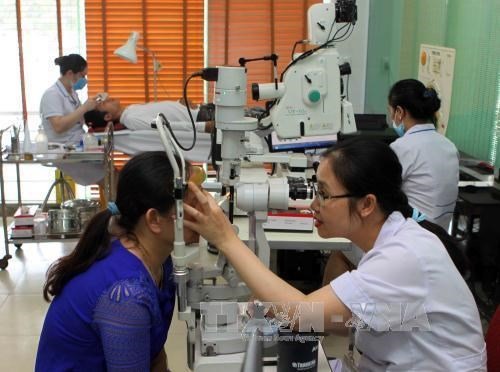 Society
Society

Việt Nam’s health insurance fund is forecasted to struggle with an enormous deficit of more than VNĐ10 trillion (US$434.8 million) this year, according to a newly released information from Việt Nam Social Insurance (VSI).
 |
| Eye examination in Vinh City’s General Hospital in Nghệ An Province. — VNA/VNS Photo |
HÀ NỘI — Việt Nam’s health insurance fund is forecasted to struggle with an enormous deficit of more than VNĐ10 trillion (US$434.8 million) this year, according to a newly released information from Việt Nam Social Insurance (VSI).
Lê Văn Phúc, deputy director of VSI’s Department for Health Insurance Policy, said that health insurance spending in the first eight months of this year has reached over VNĐ50trillion ($2.17billion), accounting for 70 per cent of this year’s planned allocation.
As many as 51 provinces and cities have overspent the fund. Some provinces such as Nghệ An, Thanh Hóa, Thái Bình and Quảng Nam, and Đà Nẵng city overspent from VNĐ500billion ($21.7million) to VNĐ1 trillion ($43.4million).
Quảng Nam and Quảng Trị reportedly used up 90 per cent of the year’s allocation.
“If the overspending continues, the health insurance fund can only afford 2018 and 2019,” Phúc said.
Only two southern provinces - Đồng Nai and Bình Dương and two cities - Hà Nội and HCM City - are able to balance the fund.
These localities have a high number of health insurance card holders and have effectively utilised the fund, Phúc said.
VSI also estimated that the reserve fund to balance the health insurance fund will be exhausted by 2020.
The VSI blamed the overspending on abuse by both healthcare organisations and patients aiming to siphon money.
Phúc said that some healthcare facilities ask patients to conduct unnecessary medical tests. Others have increased hospital fees by over 40 per cent by adding more beds to allow unnecessary hospitalisations.
In Hà Tĩnh Province, healthcare quality at some hospital departments is not ensured. They mobilise far fewer medical workers per bed than the standard of one worker per bed. Doctors still prescribe high-cost drugs instead of cheaper relevant ones.
According to VSI, health insurance overspending has also been blamed on increasing healthcare service prices, and on a health insurance policy that came into effect early last year. Accordingly, people with health insurance cards at the district level can get health check-ups or treatment at any health facility they want within their own district without the requirement of showing referral papers as before. Many people have taken advantage of this new regulation to go to healthcare facilities many times for check-ups and to get free drugs.
According to Đàm Hiếu Trung, deputy director of VSI’s centre of health insurance assessment and multi-level payment in the northern region, in the first seven months of this year, there were as many as over 91 million check-ups of health insurance card holders with total payment of nearly VNĐ46.7 trillion ($2.03 billion).
As many as 31 provinces have increased health examination and treatment spending by over 40 per cent compared to the same period of 2016. Some provinces such as Kon Tum, Lạng Sơn, Khánh Hòa provinces have increased the allocation by over 70 per cent, he said.
Using its the supervision system, the VSI discovered 1,580 patients having check-ups eight or more times in July.
For example, patient Tiền Văn B had check-ups 132 times at seven healthcare facilities in the first eight months of the year. The total health insurance payment added up to more than VNĐ30.3 million ($1,317).
Phúc from the Department for Health Insurance Policy said that penalties imposed on health insurance fund abuse have not been strict. Except for criminal punishment for some cases, in some other cases, disallowed expenditure deductions are applied.
Trung said that VSI has asked provinces and cities to assess abusive actions, revoke illegal spending and publicise this information on local web portals. — VNS




